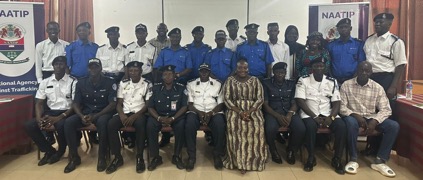
The event held at National Nutrition Agency (NaNA) in Kanifing, also sought to expose participants to National Referrals Mechanism and other key issues, aimed at curbing human trafficking in the country.
It would be recalled that the agency in the past has been instrumental in preventing the growing menace by protecting victims and prosecuting offenders. This is part of the agency’s broader mandate to ensure safety of vulnerable individuals and make Gambia a trafficking-free environment.
Welcoming the participants, Isatou Dabo, executive director of National Agency Against Trafficking-In Persons (NAATIP), commend the Police High command for the collaboration, reminding that combating human trafficking is not a one-man show, but one that requires the concerted efforts for all.
Dabo said the work they do at the agency and police as enforcers of the law on daily basis, would go a long way in improving the lives of vulnerable individuals in the country.
She recalled that in the past, NAATIP conducted series of trainings for law enforcement officers.
"But this training is the first of its kind in the sense it brings together Station Officers from different jurisdiction within Kanifing Municipality and subsequently this would roll down to the West Coast, LRR, CRR and others regions in the country. "
She described the training as a step in the right direction and one that would significantly help in curbing the growing scourge of human trafficking in the country.
Dabo acknowledged that human trafficking is a growing threat, further reminding that some of the participants as part of their daily routine come across cases that are either direct cases of TIP or in one way or the other related to it, but may or may not know it is Trafficking-In Persons.
She made reference to present day instances where people would pay an amount money to get to a destination as in case of some ‘back-way’ boys or Smuggling of Migrants and would not get to their preferred destination.
Some of this type of cases, she added, might come to the Police Stations and it is ‘therefore important for police to be equipped with the requisite knowledge and expertise to be able to make distinction and identify what forms part of TIP and what does not.’
NAATIP ED maintained that after the training participants would be able to make informed decision and know the steps to take as a law enforcement officers, especially when faced with such circumstances whether at the station or elsewhere when duty calls.
That, she added, would also foster cordial relations between the agency and law enforcement agencies bearing in mind that when it comes to TIP, they are not only looking at the criminal element of it, but also protection, partnership and investigation, among a host of others.
Thus, the forum, she added, would also enable participants to know the existence of the National Referrals Mechanism, vulnerable migrants including victims of trafficking, saying ‘if these trainings are not conducted it would be difficult to clearly identify what the procedures are in that national document and what referral pathways law enforcement agencies are supposed to follow.’
While describing the forum as a gamechanger, NAATIP ED also called on participants to make the forum interactive and be ready to share and learn from each other.




